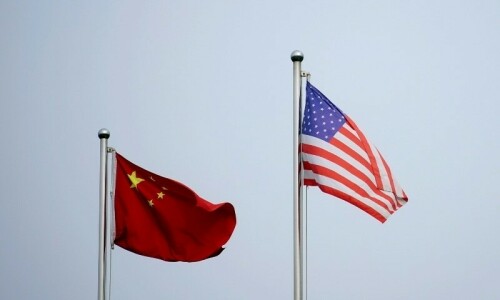THE manner in which Afghan refugees are being repatriated from Pakistan is unfortunate. Under the Citizens’ Act, anyone born in Pakistan is a Pakistani citizen. If you apply this law, relatively few Afghans will be repatriated. According to international law, only those who are not registered as refugees can be deported, and that too under specified conditions (which are not being followed), one of which emphasises safeguarding their dignity.
Disturbing news is emerging from the Afghan detention centres and from thanas that are involved in ‘rounding them up’. There are cases where minor children have been sent to locations in Afghanistan while their parents have been left behind. There have been cases where women and their babies have forcibly been put on a bus to Afghanistan without a male relative.
Meanwhile, corruption is rampant. I personally know of cases where Rs20,000 per month is paid to a middleman who guarantees that repatriation will not take place. In addition, the staff of state agencies do not allow persons at the detention centre to meet their family or lawyers, and there have also been cases where the deportees, both old and young, have been beaten up by police and Rangers for no obvious reason.
The majority of the deportees have been born in Pakistan, and they have never seen Afghanistan in their lives. Also, they have no families left in Afghanistan. They are especially concerned about their women, who will not be able to work or study in Afghanistan and will be discriminated against in other ways after they have enjoyed a more liberal society in this country. A number of musicians, singers, and artists are equally afraid for their lives and punishment from the Taliban regime.
The repatriation has divided the progressives of Sindh.
Karachiites have many complaints against the Afghans, and they seldom differentiate between Afghans and KP’s Pakhtuns. They claim that Afghans introduced the culture of guns and drugs in the city and that other groups had to resort to the same tactics to protect themselves. They also claim they have become big shareholders in Karachi’s businesses. They finance construction companies, real estate purchases, and even small entrepreneurs in setting up roadside businesses. They claim that much of the finances for all this have come from the Afghan transit trade and from supplying Nato troops in Afghanistan. With these enormous earnings, the Afghans have purchased textile, electronic goods, used clothes and shoes and a number of other markets in the city. They also charge for arranging protection for roadside Pashto-speaking rehris. All this has made them major players in Karachi’s economy. They also work as building site labour and as coolies at Karachi’s wholesale markets which is their main occupation.
The strongest support for Afghan repatriation understandably comes from Sindhi nationalists. Migration to the province (especially to its urban centres) has changed its demography, and if it continues, the Sindhi-speaking population might well become a minority. The migrants have occupied land in the urban areas and are also becoming middlemen to service agricultural production.
However, it must be remembered that almost all of these ‘crimes’ against the original population of Sindh were the result of government policies that were designed with the approval of powerful Sindhi politicians and implemented by senior Sindhi bureaucrats. Three remarkable books (The Case of Sindh by G.M. Sayed; The Case of Karachi and Sindh Under One Unit both by Prof Aijaz Ahmed Qureshi)tell us the whole story. Unlike the 1947 migrants, the Afghan migrants had no hand in developing these policies.
The Afghan repatriation has divided the progressives of Sindh into pro- and anti-repatriation groups. This is unfortunate and needs to be reconciled. There can be a case made for Afghan repatriation, but on humanitarian and legal grounds, it needs to be revisited. Persons who have been born and grown up in this country should not be deported. The same applies to women who have been born in Pakistan and who face a bleak future in an anti-women country. Similarly, artists and entertainers should not be sent back for they will not only lose the opportunity of performing but also fear for their lives.
However, more important than anything else is that the repatriation process should respect the human rights of the deportees and with proper documentation. Given the brutal nature of our state and the strong anti-poor bias of our elite policymakers, this is difficult but should be attempted. Also in dealing with the repatriation process it should be remembered that it is more than possible that Pakistan will require the support of the Afghan nation in the not-too-distant future to stabilise itself.
The writer is an architect.
Published in Dawn, November 13th, 2023












































Dear visitor, the comments section is undergoing an overhaul and will return soon.